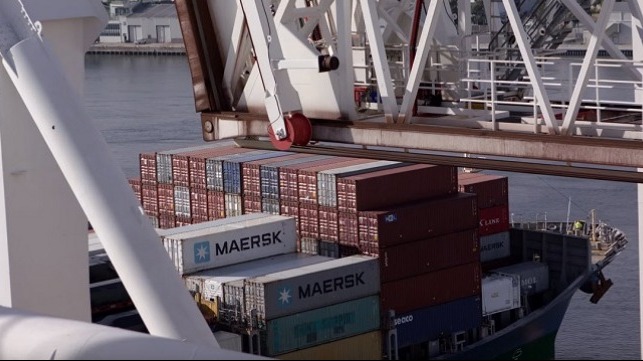 file photo
file photo
_x000D_
By The Maritime Executive 2019-07-08 20:53:20
_x000D_
_x000D_
Australian wharfies are striking for 48 hours at DP World’s Brisbane, Sydney and Fremantle container terminals, and for 96 hours in Melbourne.
_x000D_
_x000D_
The Maritime Union of Australia (MUA), part of the Construction Forestry Maritime Mining and Energy Union (CFMMEU), says the strike is a fight against automation, outsourcing, cuts to income protection insurance and what it claims is dishonest bargaining. DP World Australia (DPWA) is Australia’s largest stevedore, and the striking workers have also imposed a range of indefinite work bans, including bans on upgrades, overtime and shift extensions.
_x000D_
_x000D_
The action follows the expiry of a three month cease-fire agreement between DP World and the MUA.
_x000D_
_x000D_
MUA Assistant National Secretary Warren Smith said: “Our members have shown incredible patience in an attempt to reach resolution with DP World, including by agreeing to hold off on any form of industrial action for three months. But despite that good will management are refusing to budge on these key issues.
_x000D_
_x000D_
“This major escalation of industrial action is about sending a clear message to management that the safety, dignity and job security of wharfies are absolutely non-negotiable,” he says “We are fully committed to reaching an agreement as quickly as possible, however we will not sell our conditions, compromise our core claims or undermine industry standards to do it.”
_x000D_
_x000D_
Smith says that union members have delivered huge increases in productivity to DP World in recent years, which resulted in substantial profits, and all workers want is to receive a fair reward for those efforts. He said the company had unnecessarily escalated the conflict earlier this year when it unilaterally stripped workers of income protection insurance.
_x000D_
_x000D_
DPWA has issued a statement saying it is disappointed that the CFMMEU has escalated its industrial action, particularly at a time when shipping lines are reviewing stevedore contracts.
_x000D_
_x000D_
“The industrial action will cause significant disruption to DPWA customers and importantly the broader supply chain of shippers, exporters and importers. DPWA employees will also be unnecessarily and avoidably impacted by these lost earnings,” said Andrew Adam, Chief Operating Officer at DPWA.
_x000D_
_x000D_
During the recent 12-week bargaining period, the union did not make any material concessions to their initial 50 claims, says DPWA. These claims include a wage increase well above CPI, without any willingness to support the needs of DPWA. The union continues to demonstrate an alarming refusal to acknowledge the commercial reality of the intense competition from automated competitors.
_x000D_
_x000D_
Unprecedented consolidation of, and changes to global shipping lines calling Australia, combined with surplus stevedoring capacity are contributing to DPWA’s challenging financial outlook. DPWA says it will continue to make an enterprise agreement on terms that secure the business’ long-term, ongoing sustainability.
_x000D_
_x000D_
More Contractual Controversy
_x000D_
_x000D_
DPWA has been involved in other contractual controversy this year. In April, DP World Australia, Hutchison Ports Australia and Victoria International Container Terminal amended their contracts with land transport businesses after the Australian Competition and Consumer Commission (ACCC) raised concerns that certain terms may be unfair.
_x000D_
_x000D_
The companies agreed, after the ACCC’s intervention, to remove or amend the terms which in DP World’s case would have allowed the stevedore to unilaterally vary terms in the agreements without notice, including fees paid by the land transport operators. DP World also had terms that limited its liability for loss or damage suffered by the transport businesses, while not offering the transport businesses the same protections. DP World’s standard agreement also required the transport businesses to pay the stevedore’s legal costs and expenses in circumstances where such payments would normally be determined by court order.
_x000D_
source: www.maritime-executive.com


